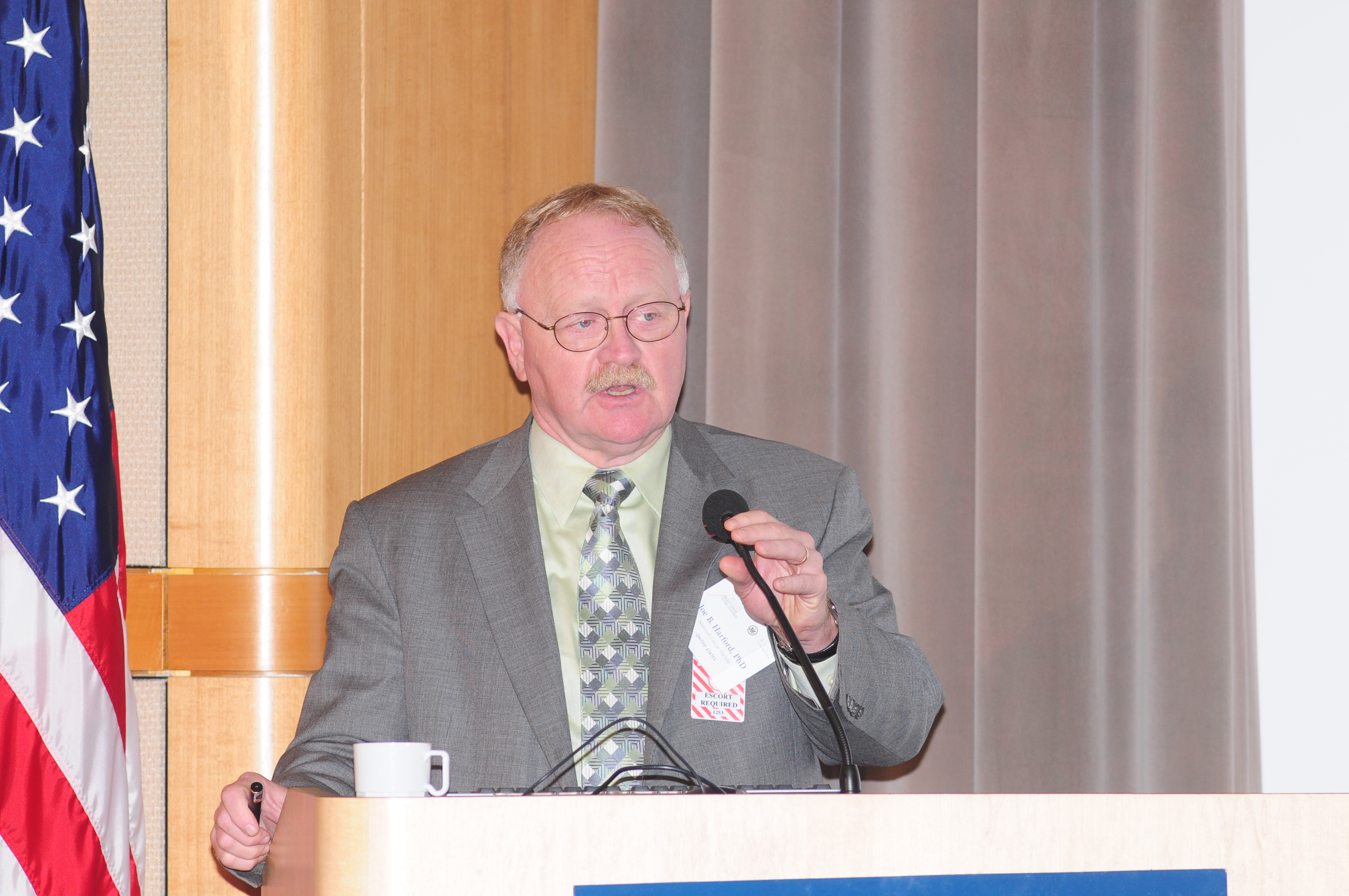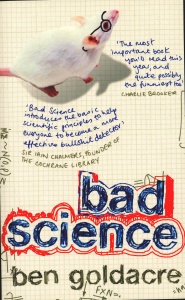January 10th, 2009 by Dr. Val Jones in Humor, Quackery Exposed
1 Comment »
The Wall Street Journal recently published an opinion piece written by Deepak Chopra, Andrew Weil, Dean Ornish, and Rustum Roy. Together they argue that Americans need to focus on healthy diet and exercise to prevent and reverse some of their diseases and conditions. This is obviously good advice – and an approach that mainstream medicine has been promoting for decades (well, technically millennia). What irks me is that they seem to suggest that this is “alternative medicine” that they (without help from the medical establishment) are fighting hard to have it included (or integrated) into general practice.
There is nothing “alternative” about healthy diet and exercise. This is mainstream, science-based medicine. The problem with Chopra and Weil is that they argue for obviously healthy behaviors and then integrate them with placebos (acupuncture and meditation have not been demonstrated to have value beyond their placebo effects) in some kind of guru’s proprietary recipe for good health.
Why not promote what has been shown to work – healthy diet and regular exercise – and leave out the placebo treatments? Why must “good health” be inexorably linked to specific culture-based practices? Why should people feel pressured to practice yoga, distract themselves with needles in their ears, or participate in Eastern meditation to be well? And why should Obama heed Chopra et al.’s call to: “make [alternative medicine practices] an integral part of his health plan as soon as possible.”
In this economy where budgets are stretched thin and healthcare service shortages are bound to worsen, the last thing we need to do is fund and promote placebo medicine. Rational people want to figure out which medical treatments and lifestyle behaviors are effective for preventive health and disease management – and focus exclusively on those interventions. It’s time to stop wasting money on scientifically-debunked therapies. We don’t have the luxury of paying for placebos like energy medicine, homeopathy, and acupuncture – let’s focus on the basics, beginning with eating healthy, portion-controlled food and getting regular exercise. That’s not alternative medicine. It’s just common sense.
January 9th, 2009 by Stacy Stryer, M.D. in Quackery Exposed
2 Comments »
Not only am I welcoming in a new year, but also a new opportunity. This is my first blog on getbetterhealth.com, and I am very excited. I previously worked with Dr. Val at Revolution Health, where I was a pediatric consultant and blogger, and I now have the good fortune of working with her on her new health website.
I plan on blogging regularly and look forward to getting to know you better – your interests, questions, and goals. Actually, I would love to learn what you want from me and how I can best serve you. It might help if I first tell you about myself and my own interests. I am a pediatrician in private practice in Maryland. I am also a blogger, speaker and writer. I just finished my first book, “Anorexia,” for ABC-CLIO and recently wrote a story which will appear in a book about pediatricians, which is being edited by Dr. Perri Klass and published by Kaplan Publishing.
I love to teach. One of my favorite aspects of pediatrics is educating parents and kids, whether it’s about breastfeeding, asthma, puberty, or the latest clinical research. I love to travel and learn about new cultures. My late-husband and I spent three years working at the Kayenta Health Center on the Navajo Reservation, where we were constantly learning about health-related customs and decisions which were so different from our own.
And I love my children. I have two wonderful daughters (if I must say so myself), ages 13 and 10 years. I enjoy writing about them in my blogs occasionally. It hasn’t bothered them yet, but I assume I will soon have to be careful about what I divulge with regards to my teenager.
A very sad part of my life was the death of my incredible husband almost four years ago. He was diagnosed with a glioblastoma, a type of brain tumor, on his 40th birthday, and died exactly one year later. His illness and death were not only difficult for obvious reasons, but also because the location of the tumor caused significant personality changes and the loss of his ability to do every day things which we take for granted, such as motivating himself to stand up from a sitting position. I learned more than I ever wanted to know about the pitfalls of the health care system and how to look for clinical research trials. Since my husband became ill, I have been working on a book for children whose parents have cancer. I am determined to finish it.
I think that’s enough about me. Now I’d like to know about you. I want to know what your issues and concerns are, and what you would like me to discuss and blog about. Let’s make this year our best and most productive yet!
Stacy Beller Stryer, M.D., FAAP
December 2nd, 2008 by Dr. Val Jones in Book Reviews
2 Comments »
I just finished reading Dr. Ben Goldacre’s new book, Bad Science. It received a very favorable review by the British Medical Journal, and so I thought I’d take a look for myself. After all, I am passionate about patient empowerment and worry sincerely for their safety as healthcare is becoming more and more of a “do-it-yourself” proposition.
Ben is a talented writer – his style is straightforward, accessible, and witty. The premise of the book is to expose the underbelly of science – how it’s miscommunicated to the public (via media, PR, and representatives from the snake oil community) and how research is often poorly designed (by uneducated scientists and government agencies, for-profit pharmaceutical companies, and biased physicians).
The case studies presented in Bad Science are especially poignant. Ben has selected a few shining examples of self-promoting figures who have risen to the highest rank of “expert” in the eyes of the media – all the while referring to themselves as “doctor” and yet only having a Ph.D. from an online correspondence school. Their legal bully tactics, fabrication of data to support their proprietary health gimmick, and extreme narcicism – are excellent studies in poor character triumphing over common sense. It is painful to see how successful snake oil salesmen can be, even in these modern and “enlightened” times.
Bad Science carefully dismantles the pseudoscience that underlies many of the claims of alternative medicine. He clearly demonstrates how research can be manipulated to demonstrate a positive effect for any therapeutic intervention, and explains why cosmetic and nutrition research are particularly rife with false positive results.
Ben also explores the role of the human psyche in misunderstanding science. Our deep desire to find a 1:1 correlation between every cause and effect is difficult to overcome. We want 1) to bring artificial simplicity out of complexity, 2) a quick fix in a pill form, 3) to believe in “breakthrough therapies,”4) to read sensational or scintillating news headlines. Unfortunately, science is often coopted to pander to these wants, rather than illuminate the truth.
Finally, Bad Science explores the many ways that statistics can be manipulated to support any claim. In fact, human intuition about math in general is quite flawed, which works against us as we try to understand the data collected by researchers.
I finished the book feeling enlightened but somewhat despairing – yearning to read a sequel, “Good Science” if only to restore my hope in the idea that wise people will have the courage to seek truth over sensationalism, and value objectivity over subjectivity for the greater good of all.
What does Ben Goldacre think we can do to combat the tidal wave of bad science on the Internet? He suggests that people of sound mind blog about the subject as frequently as possible, so that those who are searching for a voice of reason may find one. I blog here and at sciencebasedmedicine.org for that very purpose.
In my next post, I’ll summarize some tips from Bad Science that will help you to recognize when a health message is likely to be inaccurate.
November 1st, 2008 by Dr. Val Jones in Announcements, Medblogger Shout Outs
1 Comment »
Regular readers of my blog will know that health fraud, misleading product and treatment claims, and deception of vulnerable populations (snake oil for cancer patients, for example) really get under my skin. For this reason, I’ve teamed up with a group of scientists and physicians to create a blog devoted to medical accuracy, transparency, and integrity in health reporting. It’s called Science Based Medicine, and we offer daily exposés of misleading health claims and practices. It’s a great way to learn about how to think critically – and to apply a scientific approach (rather than subjective and anecdotal) to discerning truth from error.
My contribution to the blogging team is to highlight online health fraud, scams, deception and misguided attempts to help consumers “live healthier lives.” I post once a week, every Thursday morning. Please head on over and check it out. It’s a great team of bloggers – and they’re looking out for you!
Here is a list of my recent posts:
A Shruggie Awakening: One Physician’s Journey Toward Scientific Enlightenment
Disintegrating Integrative Medicine: Lessons From Baking
When Further Research Is Not Warranted: The Wisdom of Crowds Fallacy
Knowledge Vs. Expertise: The View From Consumer Land
October 19th, 2008 by Dr. Val Jones in Expert Interviews
No Comments »

Even though I live in DC it was my first visit to the Department of State. I was surprised by the level of security (I passed through 2 metal detectors to get to the conference) and the multitude of languages spoken by the attendees. Many were wearing headphones, which were connected to a translator service. The lectures were rapidly translated into the various languages of the audience members (the way it would for the United Nations meetings), though I enjoyed the ability to listen directly to the speakers in my native tongue.
I was able to interview a keynote speaker, Joe Harford, Ph.D., the Director of the Office of International Affairs, of the National Cancer Institute. Here’s what he had to say:
Dr. Val: Why is the risk of breast cancer (in the US) greater now than in previous generations?
Dr. Harford: The main cause of the increase is related to changes in reproductive patterns within the population as a whole. Women who have fewer children (and later in life) tend to have higher risk of breast cancer. This is associated with hormones – the breast is a hormonally responsive organ and breast cells that convert to tumor cells also have hormone receptivity. Pregnancy and breast feeding are protective for breast tissue. Women can check out their risk for developing breast cancer by filling out this
short, online assessment tool at the NCI.
Read more »












